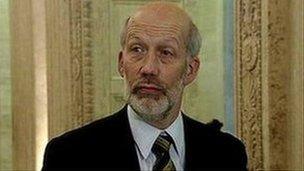Chief constable rule change: David Ford 'little Nero' says DUP
- Published

Justice Minister David Ford announced the change on Monday
The justice minister has been criticised as a "little Nero" after announcing plans to change criteria for the job of NI's chief constable.
At present applicants must have served at assistant chief constable rank for a minimum of two years outside of NI.
The change would make the two-year criteria "desirable" rather than mandatory.
David Ford announced the change on Monday, but the matter will now go before the Stormont executive.
Sinn Féin and the Democratic Unionist Party expressed outrage at the move.
Jonathan Craig, of the DUP, said: "Does he actually think he sits there as a little Nero and has the right to change rules?"
Unless Mr Ford, an Alliance minister, withdraws the proposal, it is likely to be overturned due to the larger numbers of DUP and Sinn Féin members on the executive.
Mr Ford told the assembly on Tuesday that he had done nothing wrong.
He told MLAs his only agenda was to ensure the appointment was governed by fairness, common sense and equality.
The first and deputy first ministers have written to Mr Ford him telling him they intend to discuss the issue at a meeting of the Executive on Thursday because the move was "significant in its likely impact on the role of the Policing Board".
Mr Ford said the decision would give the Policing Board more latitude and he was entirely respectful of its primacy in making the appointment.
He added that he was happy to explain the decision to ministers on Thursday.
Mr Ford's comments follow the news last week that the current PSNI Chief Constable, Matt Baggott, will retire in September.
Criteria
Deputy Chief Constable Judith Gillespie has already said that she will retire in March.
Mr Ford said the deputy chief constable was aware of the process of considering changes to the job criteria, which had begun in 2013, and that his changes would enable her to apply for the position of chief constable.
Speaking during the assembly's Question Time, Sinn Fein's Mickey Brady asked the minister if he had contacted Ms Gillespie to apologise.
"The deputy chief constable gave the two-year rule as one of the reasons for retiring, and now this announcement came some weeks later," Mr Brady said.
Mr Ford told MLAs he had no reason to apologise to Ms Gillespie.
Speaking to BBC Radio Ulster on Tuesday, Mr Craig, who sits on the Policing Board, which appoints the chief constable and holds him to account, was critical of the justice minister.
He said Mr Ford had "compromised" the recruiting process that was already under way and had "introduced poison into the entire system".
DUP MLA Jonathan Craig criticised the move by David Ford
Sinn Féin's Gerry Kelly, who also sits on the Policing Board, said the announcement was an "unwelcome and ill-timed intervention" that had angered many.
"This position of chief constable is one that needs to inspire confidence. Changing recruitment practices while the Policing Board is preparing an appointments panel can only be seen as an interference in that process.
"It is clear that David Ford has attempted a solo run in relation to this matter and should now explain himself to the Policing Board and to his executive colleagues."
Mr Ford's amendment would have widened the pool of potential internal PSNI applicants.
Eligible
Potential applicants would, instead, have to have successfully completed the Strategic Command Course, or an equivalent.
As it stood, only one senior PSNI officer, Assistant Chief Constable George Hamilton, was eligible to apply to succeed Mr Baggott as he served almost three years at the same rank in Scotland.
The amendment would mean other high-profile PSNI assistant chief constables who have completed the Strategic Command Course, including Will Kerr and Drew Harris, could apply.
So, too, would senior officers from other UK police forces who have not been in post for more than two years.
The Strategic Command Course is the UK's national qualification course for promotion to chief officer. It is an essential criteria for anyone wanting to apply for the position of assistant chief constable with any UK police force.
Applicants go through an intensive three-day assessment centre and then on to the course, if selected.
- Published28 January 2014
- Published22 January 2014
- Published22 January 2014
- Published22 January 2014